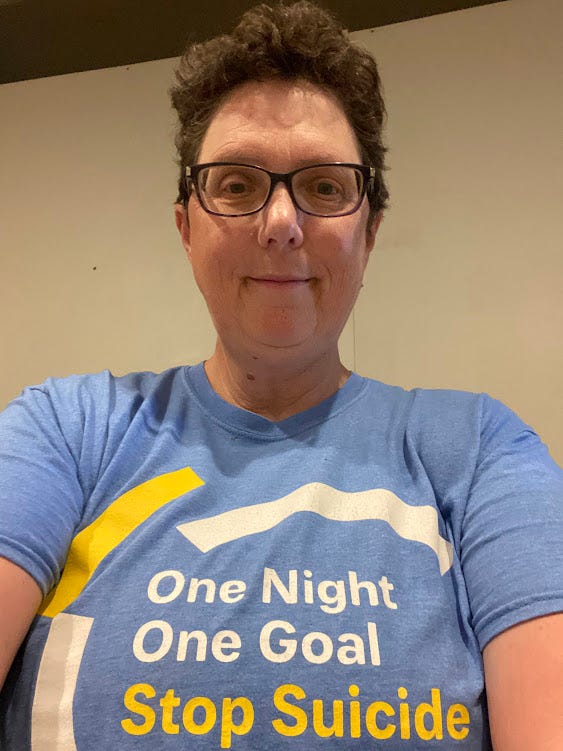Speaking the Unspoken
Talking about suicide loss with strangers in unexpected places
For the record, I don’t like talking about suicide loss. It’s hard. Even after all these years, it still brings up guilt and grief and shame. I spent so many years alone with my grief, talking about it now feels uncomfortable and dangerous, like I’m breaking some unspoken taboo.
But I can’t not talk about it anymore.
Even at Great Wolf Lodge, the last place on earth I’d expect to have a deep conversation with a stranger.
I was sitting by the ice cream booth, nursing a triple mocha and wondering what on earth had possessed me to volunteer to chaperone my daughter’s scout troop.
Great Wolf Lodge, if you’re not familiar with it (lucky you!) is a huge indoor water park resort. We took our kids there when they were little. Ack! Don’t do it! I was in constant fear of them drowning in the wave pool or getting trampled on by hordes of screaming kids shoving and pushing their way to the front of the line.
Outside the water park in the lodge area, teens and tweens on a sugar high run pell-mell shouting through the hallways, trying to rack up points on a magic treasure hunt game.
Not exactly the place for meaningful connections.
Unless, apparently, you happen to be wearing a suicide prevention t-shirt.
A woman walking by my table glanced at me, took a second look, then detached herself from her husband and young daughter, waving them off to head into the water park without her.
She smiled at me. “I like your shirt.”
Then her face grew serious.
“Did you lose someone?”
“Yes,” I admitted reluctantly, feeling that old, familiar resistance to talking about it. “My brother and my sister.”
She nodded in acknowledgement, one survivor to another.
“I lost my dad,” she confessed. “I was just a kid when he died. I was convinced it was my fault. If only I’d been a better kid, he wouldn’t have left like that.”
My heart ached for her, and for the innocent child she’d been. I know that feeling of self-blame all too well.
“I thought it was my fault too, when my brother John died,” I confided. “I was only 14. I didn’t know how to process it. Neither did my family. So we just didn’t talk about it. We went on as if nothing had happened when really, we were all suffering so much.”
I stared into space, lost in my memories. “I don’t really blame my parents. Nobody talked about mental health back then. The priest said suicide was a sin, so we didn’t even have a funeral for him. Can you imagine?”
“No funeral, no closure. It didn’t seem real. I made up a story in my head that John had done something really bad so he ran away to South America. I couldn’t believe he was gone for good, you know? Especially without saying goodbye to me.”
My new friend shook her head. “I’m so sorry. That’s terrible.”
“Yeah. It took me a long time to learn how to talk about it all. It’s still kind of hard. But I’m glad you stopped to talk.”
“Me too,” she said. “It’s so much worse when you feel alone with it.”
We sat together surrounded by the cacophony of crying babies and the roar of the water park, our own little island of connection and solace.
I’m glad I wore that shirt.
If you’ve been affected by suicide, my heart goes out to you. You don’t have to deal with it alone. Here are some resources:
American Foundation For Suicide Prevention (AFSP) — Support Page
AFSP — booklet with suggestions for helping young loss survivors
National Alliance on Mental Illness (NAMI) — Family Support Group



You have such a big heart, V, and it really comes through in every word you write. If you ever want to have a mini-memorial for your brother and sister I am here to help.
yes it is hard and doesn't get easier quickly. Thank you for writing this